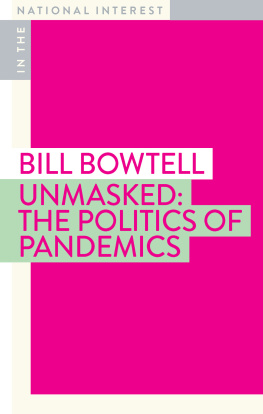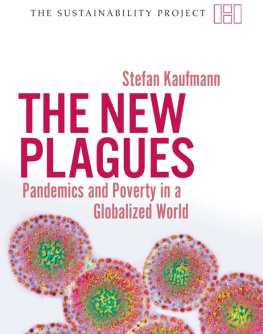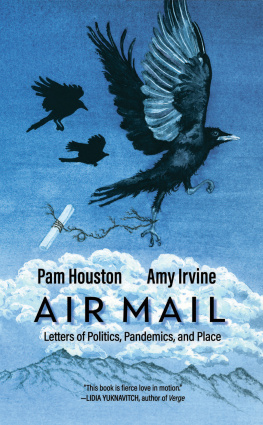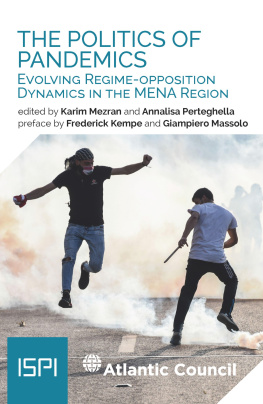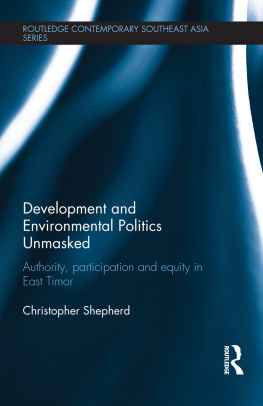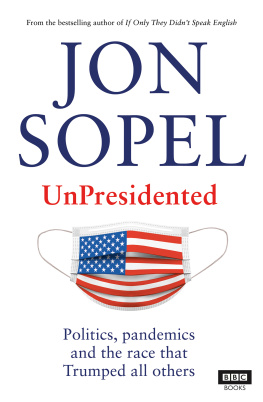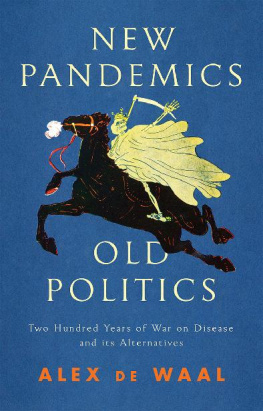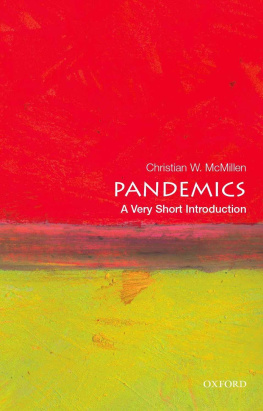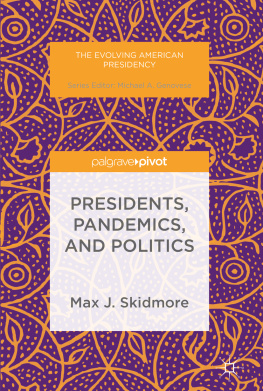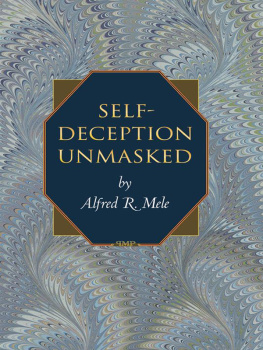Bowtell Bill - Unmasked: the Politics of Pandemics
Here you can read online Bowtell Bill - Unmasked: the Politics of Pandemics full text of the book (entire story) in english for free. Download pdf and epub, get meaning, cover and reviews about this ebook. year: 2021, publisher: Monash University Publishing, genre: Politics. Description of the work, (preface) as well as reviews are available. Best literature library LitArk.com created for fans of good reading and offers a wide selection of genres:
Romance novel
Science fiction
Adventure
Detective
Science
History
Home and family
Prose
Art
Politics
Computer
Non-fiction
Religion
Business
Children
Humor
Choose a favorite category and find really read worthwhile books. Enjoy immersion in the world of imagination, feel the emotions of the characters or learn something new for yourself, make an fascinating discovery.
- Book:Unmasked: the Politics of Pandemics
- Author:
- Publisher:Monash University Publishing
- Genre:
- Year:2021
- Rating:5 / 5
- Favourites:Add to favourites
- Your mark:
- 100
- 1
- 2
- 3
- 4
- 5
Unmasked: the Politics of Pandemics: summary, description and annotation
We offer to read an annotation, description, summary or preface (depends on what the author of the book "Unmasked: the Politics of Pandemics" wrote himself). If you haven't found the necessary information about the book — write in the comments, we will try to find it.
Unmasked: the Politics of Pandemics — read online for free the complete book (whole text) full work
Below is the text of the book, divided by pages. System saving the place of the last page read, allows you to conveniently read the book "Unmasked: the Politics of Pandemics" online for free, without having to search again every time where you left off. Put a bookmark, and you can go to the page where you finished reading at any time.
Font size:
Interval:
Bookmark:

NATIONAL INTEREST
In 2020, the butchers bill for decades of denying the science of climate change and the threat of viral pandemics came due.
Prevention is possible if we understand transmission, the core business of viruses. But prevention is the business of humans.
Nature creates viruses. Politics creates pandemics.
Nature creates viruses. But people and politics create pandemics. And pandemics create new politics. In the 1980s, the toxic politics of the response to HIV/AIDS turned a serious but manageable viral threat into a global pandemic that took the lives of thirty-two million people and brought illness and suffering to millions more. In 2020, COVID-19 emerged into a world where many governments had failed to pay attention to the past, and so they were unprepared and unable to stop its global spread. But some countries had learned the harsh lessons of HIV/AIDS, and had contained SARS1, Ebola, Zika and MERS. When coronavirus hit, they knew what to do to save their people from avoidable infections and deaths.
In Unmasked: The Politics of Pandemics, Bill Bowtell draws on his four decades of experience in the global and local politics of public health to examine why some countries got it right with coronavirus while others collapsed into misery and chaos. He looks closely at the critical weeks when poor planning brought Australia to the brink of disaster, until the Australian people forced their governments to put public health before politics. Unmasked reveals how and why our politicians failed us during the greatest public health crisis of this century to date.
BILL
BOWTELL

Unmasked: The Politics of Pandemics
Copyright 2021 Bill Bowtell
All rights reserved. Apart from any uses permitted by Australias Copyright Act 1968, no part of this book may be reproduced by any process without prior written permission from the copyright owners. Inquiries should be directed to the publisher.
Monash University Publishing
Matheson Library Annexe
40 Exhibition Walk
Monash University
Clayton, Victoria 3800, Australia
https://publishing.monash.edu
Monash University Publishing brings to the world publications which advance the best traditions of humane and enlightened thought.
ISBN: 9781922464248 (paperback)
ISBN: 9781922464262 (ebook)
Series: In the National Interest
Editor: Louise Adler
Project manager & copyeditor: Paul Smitz
Designer: Peter Long
Typesetter: Cannon Typesetting
Proofreader: Gillian Armitage
Printed in Australia by Ligare Book Printers
A catalogue record for this book is available from the National Library of Australia.
In this book, I draw on four decades experience at and around the intersection of politics and pandemics. This stretches from how Australia and the world responded to HIV/AIDS in the 1980s to the grim circus of coronavirus and COVID-19 in 2020.
I survived the mayhem and carnage of HIV/AIDS. I saw at close quarters how cynical politicians and poor decisions led directly to millions of deaths, severe and avoidable illnesses, and social upheaval. I did not think that this could happen again. But I was mistaken.
We must understand both what went so wrong and what was done well. We should learn from those who did better. And we must discard those structures and assumptions that served us poorly, replacing them with structures and policies that in the future will better anticipate, contain, manage and eliminate viral challenges with the least possible toll of injury, death, and economic and social disruption.
Above all, it is imperative that we strengthen our own public health infrastructure and the international public health architecture centred on the World Health Organization (WHO) and other agencies.
And we have to do this now. We can never know when the next viral threat will come along, only that it is inevitable and can happen anytime and anywhere.
I am Australian and my views are drawn predominantly though not exclusively from my career in Australian public life. The narrative here around the emergence of coronavirus is set in the context of how things developed in Australia over 2020.
Australia is a geographically large country with a relatively small population. It is governed by a complex federal edifice created in 1901 that melded together the models of Washington and Westminster. This might have been the height of enlightened nineteenth-century liberal political thinking, but, like its parents in the United Kingdom and the United States, Australias federation has far outlived its usefulness. It has become a dead weight around the neck of Australias democracy and people. Our ramshackle government structures are outmoded and cannot cope with the scope and gravity of the planetary emergencies that confront us.
We are a complex and sophisticated country now greatly hobbled by simplistic and unsophisticated politics and politicians. The ease with which a simple virus inflicted serious, lasting damage on the health, wealth and happiness of the Australian people is the clearest possible evidence that things have gone badly wrong. The levers of democratic power have moved from the people to a very few whose visions and instincts are no longer grounded in building common wealth, and who cannot be trusted to act in the national rather than sectional interest. The fractured response to coronavirus is just the latest in a long list of policy failures that have diminished the nations capacity to deal with the foreseeable problems and challenges hurtling towards us.
It appears that we are about at the end of the beginning of the pandemic, with much more to endure before better times return. So while it is still too early to write a comprehensive history of how and why things turned out so badly, we have been through enough for me to make a start.
In writing this book, I have done my best to base my conclusions and views on a fair assessment of the facts and evidence as disclosed on the public record. But I have been greatly hampered by the fact that all the documents, minutes, proceedings and even the memberships of the key advisory committees have been declared state secrets. Lacking access to these records, I have relied on public interviews, articles, and many informal and illuminating discussions with senior politicians, officials and front-line personnel at every level.
On 8 April 2020, the Australian Senate established the Select Committee on COVID-19, chaired by Senator Katy Gallagher. The committee is doing sterling work in attempting to hold Australian ministers and officials to account. I have also drawn on evidence given to the select committee and the various other committees established to investigate and report on the significant events and lapses in the administration of Australias pandemic experience.
Many opinions and views have been shared on social media. Assertions without evidence are just that and should always be discounted. But I have found there are many thoughtful and incisive interlocutors on social media who have timely, evidence-based insights. If journalism is the first draft of history, then Twitter has become, for better or worse, the first draft of journalism.
Font size:
Interval:
Bookmark:
Similar books «Unmasked: the Politics of Pandemics»
Look at similar books to Unmasked: the Politics of Pandemics. We have selected literature similar in name and meaning in the hope of providing readers with more options to find new, interesting, not yet read works.
Discussion, reviews of the book Unmasked: the Politics of Pandemics and just readers' own opinions. Leave your comments, write what you think about the work, its meaning or the main characters. Specify what exactly you liked and what you didn't like, and why you think so.

